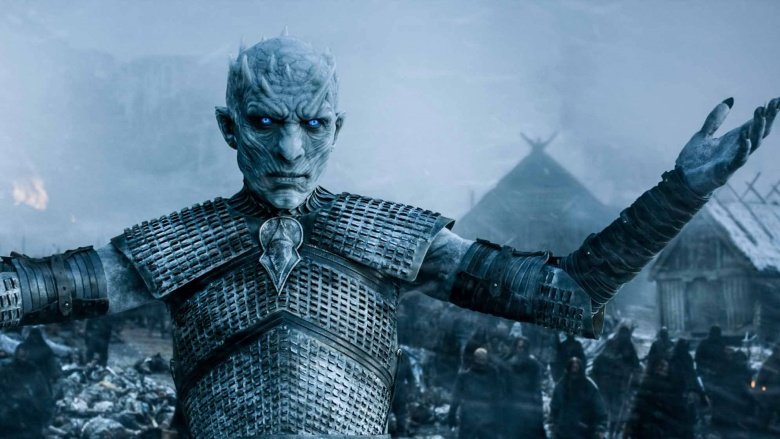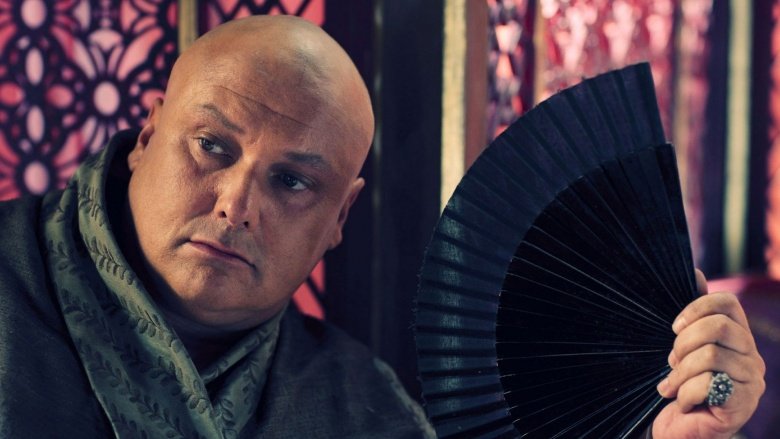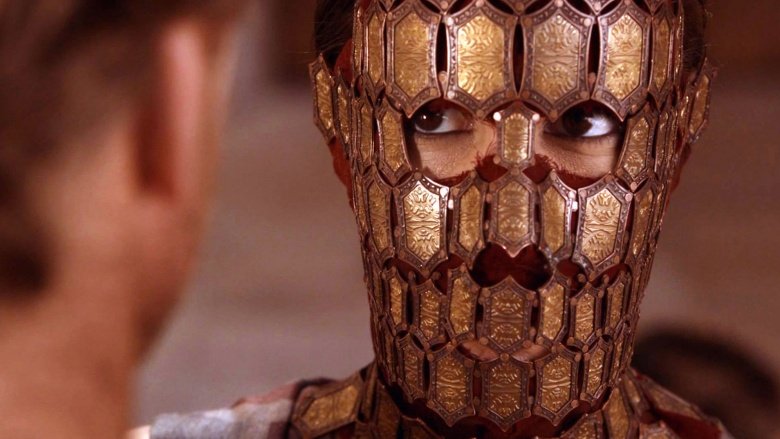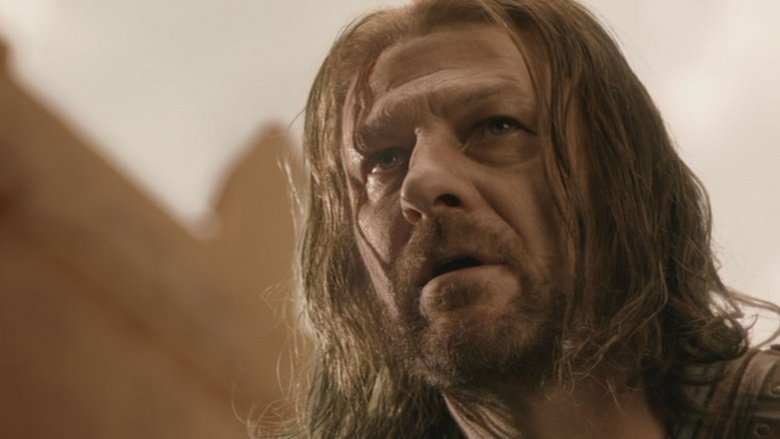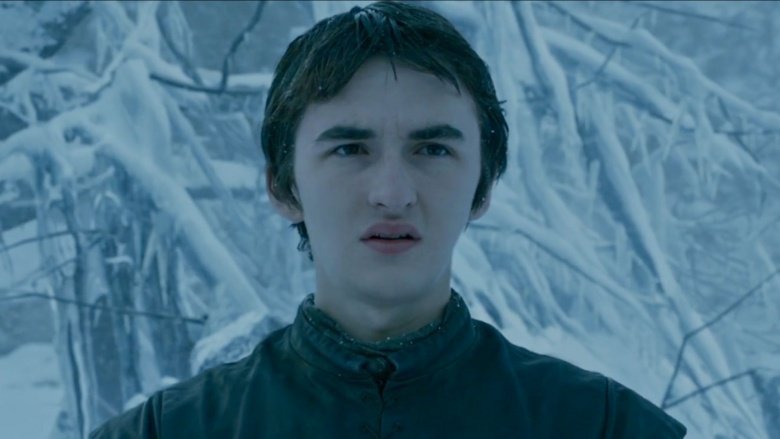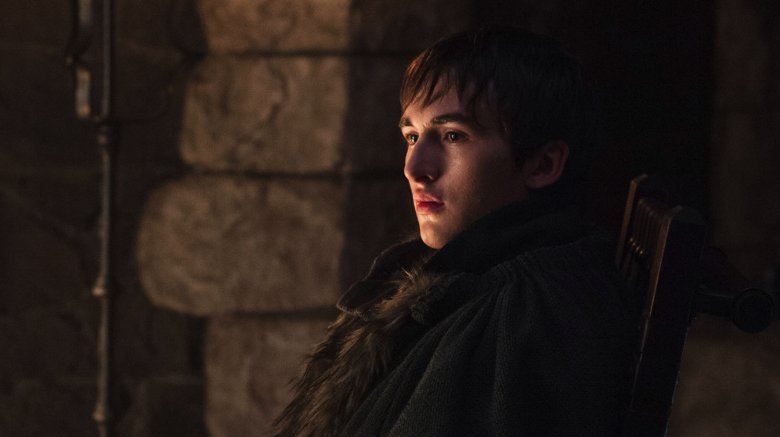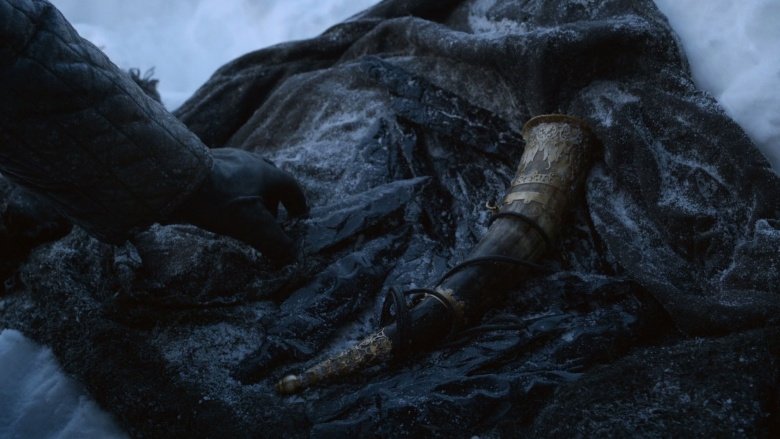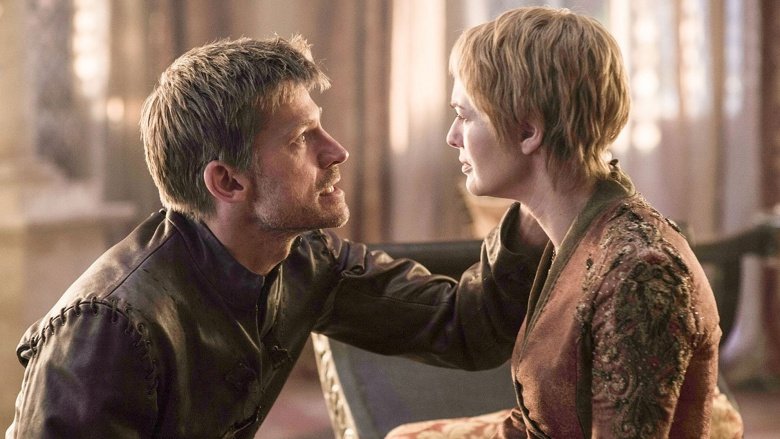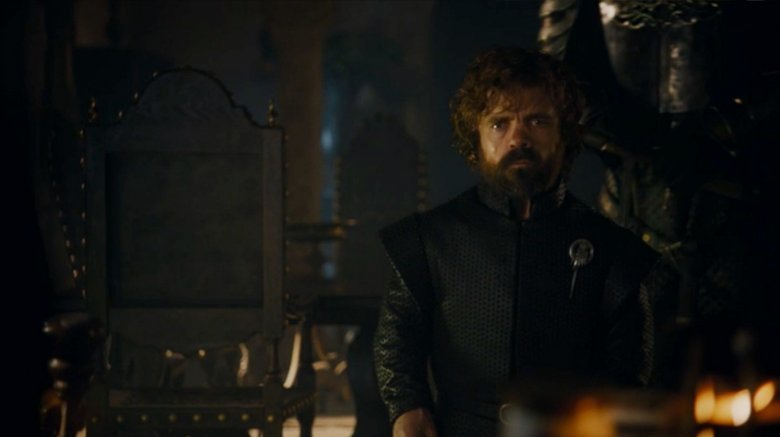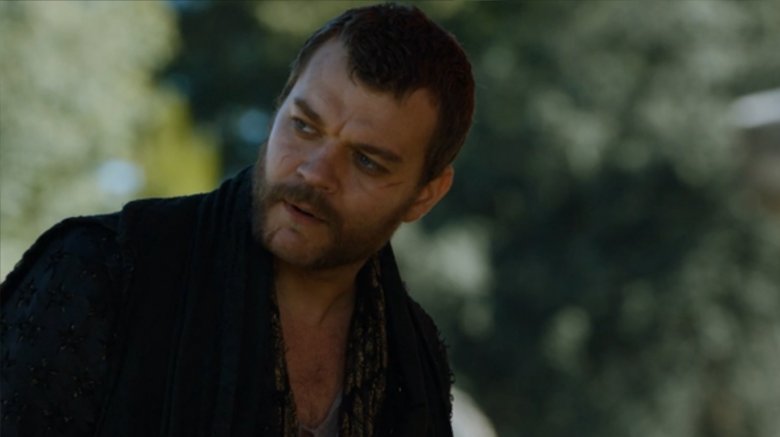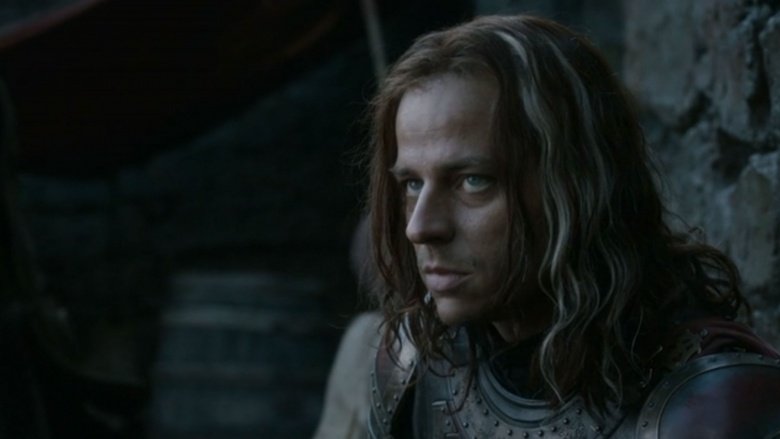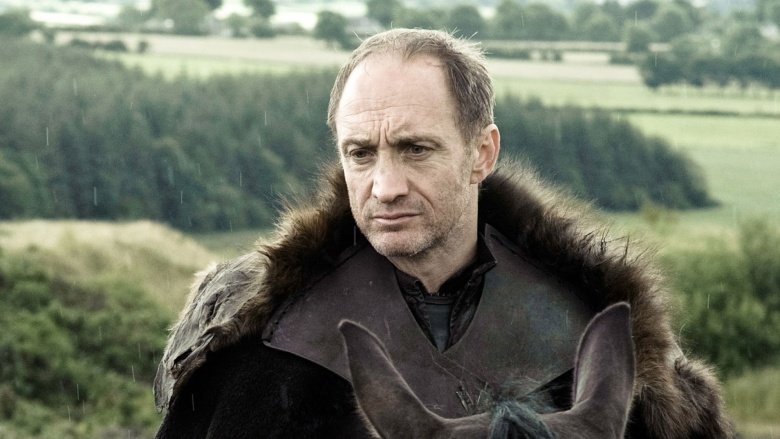The Craziest Game Of Thrones Fan Theories
Ever since A Game of Thrones—the first book in the A Song of Ice and Fire series—was published in 1996, fans have been taking to the internet to disseminate the books and discuss their theories. After HBO's television adaptation of the novels premiered in 2011, that fanbase has grown exponentially—and with it, the number of crazy theories making their way around the web.
The sheer number of these wacky theories is beyond count, so we'll just take a look at some of the most prominent ones that are commonly discussed. Make sure you bring your tinfoil life jackets, because that's the only thing that will save you from the insanity lurking under the surface. But fair warning—below the cut, this article contains spoilers for the entire Game of Thrones TV series as well as the A Song of Ice and Fire books.
Varys is a Merman
The theory: Lord Varys is actually a merman—or "merling", as they're called in the ASoIaF books—and is aiding Daenerys because he wants her dragon to melt the Wall, thereby flooding large regions of the North, which could be used as a new realm for his people.
Evidence: In the first book, Arya hears Lord Varys and Illyrio conspiring in passages under the Red Keep. The pair entered the passage she was hiding in via a hidden well. She follows them for awhile before losing them, and eventually ends up in the sewers—where she has to swim completely out of the Red Keep in order to find her way back. Presumably, that is how Illyrio and Varys also exited the Keep, because they're both merlings, and thus strong swimmers. Varys claims to be from Myr, which sort of sounds like "mer" in the word merling. Varys is often associated with Littlefinger, who happens to own a ship named "The Merling King." (The theory also posits that Littlefinger is a merling as well.)
At one point in A Clash of Kings, Tyrion threatens to throw Varys off of a ship. His response? "You might be disappointed by the result. The storms come and go, the waves crash overhead, the big fish eat the little fish, and I keep on paddling." We never see what Varys' presumably aquatic lower body looks like, because he keeps it covered in flowing robes. Three characters in the books are notably overweight—Varys, Illyrio, and Lord Manderly. And what is Lord Manderly's sigil? A merling. Merlings apparently like to eat people and at one point in the books when cannibalism is mentioned, Lord Varys licks his lips.
Verdict: This one is wayyyyy out there. Pretty much the entire basis of this theory can be traced to that single quote from Varys about how he "keeps on paddling." Instead of taking it as the survival metaphor it was meant to be, extremely creative readers came up with this. Also, what does being fat have to do with being another species—one that wants to eat all the humans? Is this just high-fantasy fat shaming by bored theorists? Finally, while we actually saw one of Dany's dragons melt a section of the Wall in the season seven finale, the fact remains that the North is cold. The Wall didn't flood the valley in front of Eastwatch. For Varys' supposed motivation to even be physically possible, he's going to have to figure out how to change the climate of the North, too. It's safe to say that this one will never happen.
What happened to Shiera Seastar?
The theory: Shiera Seastar—a book-only character who was the half-sibling and lover of Brynden Bloodraven (the Three-Eyed Crow)—still lives today, under the guise of Quaithe, the mysterious masked shadowbinder from Asshai.
Evidence: Shiera was the last of the "Great Bastards," born to Serenei of Lys and Aegon IV "the Unworthy." She was considered an extremely great beauty for her time, and often had many men (including her half-siblings Bloodraven and Bittersteel) fighting for her affections. She was also extremely well-read, and known to speak at least a dozen languages and often spent her time pondering ancient scrolls and texts. Like her mother (who many believed to be hundreds of years old when she was Aegon's mistress), Shiera was rumored to practice dark arts to maintain her youth and extreme beauty—including bathing in the blood of maidens. What happened to Shiera after Bloodraven was disgraced and exiled to the Wall is unknown. All the other "Great Bastards" went on to do things that would have major implications in the current storyline—except Shiera.
Quaithe is a shadowbinder, as is Melisandre, the Red Priestess who served Stannis Baratheon (and briefly, Jon Snow). Melisandre is shown to be extremely old, and uses a glamour—perhaps with the aid of her necklace—to give the illusion of youth and beauty. Shiera Seastar also had a necklace she was often known for wearing constantly. Quaithe keeps her face hidden behind a mask, according to the customs of shadowbinders. Shiera means "star of the sea," which is another name for Stella Maris, a star once used by sailors for navigation. "Star of the Sea" also was an ancient title for the Virgin Mary, who was supposed to serve as a guide for believers who lived outside of Israel—much like Daenerys, who's lived most of her entire life away from Westeros. Quaithe often tells Dany that she wants to "show her the way," and appears to her in visions of starlight—trying to guide her the correct way in order to return to Westeros. Quaithe has extensive knowledge of Westerosi language and culture, referring to several people in her prophecy by their sigils—knowledge that would not be common if you were not from Westeros yourself. Quaithe uses a "glass candle" (made of obsidian) to communicate with Daenerys from afar—much like Bloodraven used the Weirwood to send Bran dreams and visions.
Verdict: I really, really like this theory. There's one quibble to be mentioned: Shiera was noted to have mismatched eyes—one blue, and one green. Quaithe does not have mismatched eyes that we know of, but as we've seen with Melisandre, a glamour can be very powerful, so disguising the color of one's eyes wouldn't be difficult for a shadowbinder. It's always bothered me that we don't know what happened to Shiera, unlike the other Great Bastards. To me, it totally makes sense that she's been Quaithe, working together with her brother and former lover Bloodraven to fight the threat of the White Walkers. Dany needs to get back to Westeros with her Dragons to face them, and that's been Quaithe's goal. Also, if you like this theory, check out this one—which suggests Melisandre was actually the daughter of Shiera/Quaithe. I'd totally love it if these theories end up to be true.
Robb and Eddard Stark are really alive
The theory: Robb, being a warg like his siblings, warged into Grey Wind when he was stabbed at the Red Wedding. Later when Grey Wind was also killed, he warged into yet another animal present at the Twins. Eddard, similarly, warged at the moment of his death—perhaps into one of the doves that took wing when he was beheaded, or even into Ser Ilyn Payne. Alternately, secret Faceless Man Syrio Forel took Ned's place and was beheaded instead.
Evidence: In the books, all the Stark children are wargs to one degree or another, even if they haven't developed those skills. We know warging at the moment of death is possible, because we see a Wildling warg do it by skinchanging into his eagle when he is killed. Ned may have the same skill, and unwittingly skinchanged when he was beheaded by Joffrey. Ser Ilyn would be a good target, as he can't speak anyway and nobody would know the difference. Or Varys enticed/forced Syrio to take Ned's place at the execution, thinking he would simply be exiled to the Wall.
Verdict: These are the grand delusions of people who can't accept that sometimes bad sh*t happens, particularly in a George R.R. Martin story. Robb and Ned miraculously escaping their deaths in two of the most pivotal scenes in the entire series would really cheapen the entire plot. Robb warged into Grey Wind—I can accept that possibility. But then subsequently skinchanging into another, random animal? Absolutely not. Ned skinchanging into Ser Ilyn is just laughable, and Ilyn Payne isn't mentally slow like Hodor, he just lacks a tongue—making the act of taking him over (especially by an untrained warg) completely impossible. As for Syrio, did these theorists forget that you have to actually slice off someone's face in order to take their identity? Given the choice of a clean death or having your head de-gloved by a Faceless Man, I think Ned would have chosen the sword.
The case of the time-traveling fetus
The theory: Tyrion is actually the son of Drogo and Daenerys, magically transported back in time as a fetus to be born from surrogate mother Joanna Lannister's womb. Joanna's legitimate child with Tywin was the dead baby born to Dany.
Evidence: King's Landing has seven gates, much like the ancient Greek Thebes. Thebes was home to Oedipus, who killed his father and married his mother. Mirri Maz Duur used Drogo's soul to swap Daenerys' baby with Joanna's. Joanna delivered Tyrion, son of Drogo and Daenerys, while Joanna's baby was delivered by Daenerys. This is why the baby Dany delivers was stillborn, and is described as being "full of graveworms and the stink of corruption. He had been dead for years." There's a bunch more "evidence" to this theory, which gives a lot more detail on "paralells" between Oedipus and Tyrion. If you'd like to read it, head over to this Reddit thread by the theory's originator, /u/xyseth.
Verdict: No, no, no, no, no. I can't even begin to list the reasons why this is bad, and wrong, and will never be true. And if George R.R. Martin ever introduces literal time travel to the books, I will probably walk away from this series forever.
Where R plus L equals J, solve for R
The theory: Robert Baratheon is the actual father of Jon Snow, not Rhaegar Targaryen.
Evidence: Robert loved Lyanna deeply, and they were betrothed. When she ran off with Rhaegar, she didn't realize she was already pregnant with Robert's child. Rhaegar ordered his Kingsguard to guard the Tower of Joy and the baby in case he and his father should fall to Robert's Rebellion. He knew the child would be the future heir to the throne should this happen—Robert's heir. Jon Snow looks like Robert, with black hair.
Verdict: No way in hell is this true. First of all, Lyanna wasn't a huge fan of Robert, which is why she ran off with Rhaegar. I seriously doubt she had sex with Robert first. I also doubt Rhaegar would have had any use for Lyanna if he found out she was pregnant with Robert's kid. All of Robert's other bastards have black hair and blue eyes, while Jon Snow has the brown eyes of his mother. The seed is strong, remember? Lyanna clearly tells Ned, "If Robert finds out, he'll kill him," during the Tower of Joy scene. Why would Robert want to kill his own heir, and the only living reminder of his beloved Lyanna? Finally, HBO released an infographic after that episode aired, which clearly lists Rhaegar and Lyanna as Jon's parents.
Bran built the Wall, and made Aerys crazy
The theory: All the "Brandon Starks" mentioned throughout the books are actually the same. Bran, son of Eddard, is also Brandon the Builder—the ancient Stark who raised the Wall in the first place. Brandon also drove the Mad King mad in the first place, by attempting to talk to him through greenseer visions.
Evidence: Stories of Bran the Builder were always young Bran's favorite as a child. He's intrinsically linked to the fight against the White Walkers with his new role as the Three-Eyed Crow. He's already affected the past (accidentally) once, during his greenseer vision which accidentally caught Hodor in its crosshairs. After he realizes his ability to do this on purpose, he can go back in time and cause the Wall to be built in the first place, thereby preserving humanity to the present day. Ned heard Bran call out in the Tower of Joy scene—what if Bran tried to prevent Aerys from going crazy by talking to him across time, but actually the unseen voices were what drove the King nuts in the first place? Old Nan confuses the various Brandons frequently in her stories, with Catelyn explaining, "She had lived so long, Mother had told him once, that all the Brandon Starks had become one person in her head."
Verdict: Meh. It's kind of a toss-up. As I mentioned previously, I'd really hate it if time-travel was introduced to ASoIaF. I think the incident with Hodor was an unfortunate accident, caused by Bran being present in a vision with past-Hodor, while simultaneously skinchanging into present-day Hodor. This created a feedback loop which fried young Walder/Wyllis' brain. I don't think that Bran has or will have the ability to actually go back in time, or change events in the past. The Mad King theory is slightly more plausible, since we do have evidence that Ned hears Bran (or at least hears something) during the Tower of Joy scene.
Bran is the Night King
The theory: A variation of the previous theory. Bran tries to stop the White Walkers in the past. Each time he fails, he tries again further back in time. Eventually, he goes all the way back to when the Night King was first created, but accidentally becomes trapped within him.
Evidence: Bran may have caused King Aerys to go mad by trying to warn him about the White Walkers. On another attempt, he becomes Bran the Builder—founding House Stark and building Winterfell and the Wall. Finally, he tries to stop the Children of the Forest from creating the Night King. He wargs into the man they've captured, and is unable to return to his own body. Trapped in time, he lives several thousand years somewhere inside the consciousness of the Night King. This is why he doesn't kill Jon at Hardhome or at the frozen lake. He was prepared to capture Viserion because he already knew what would happen. This also fulfills the Three-Eyed Raven's remark to Bran that "you will never walk again, but you will fly."
Verdict: Creative, but falls apart under scrutiny. You can get trapped within a vision if you stay too long. But "the ink is dry" on the past, and Bran cannot change it—he's like a ghost. Bran could possibly have driven Aerys over the edge, but the rest of this theory doesn't work. In "The Door," Bran only affected Wyllis indirectly—he warged into present-day Hodor and this time-bridge fried Wyllis' brain. Since Hodor was already impaired in the present, this was a pre-existing outcome, not a change to history. Bran cannot warg into a person he sees in his visions. For that matter, he cannot warg into people at all, unless they are already mentally impaired in some way.
Dragonglass = poop
The theory: Dragonglass, that mysterious substance which kills White Walkers, is actually the fossilized remains of dragon excrement.
Evidence: Daenerys' dragons (in the books) begin to make tunnels/hollows in the brick under the Great Pyramid of Meereen. On Dragonstone, tunnels are everywhere under the island's surface, and most of those tunnels contain dragonglass. The glass is created by the digested rock/sand (silica) from the tunneling process, combined with the fiery innards of a dragon, which then hardens and cools in the air after the dragon excretes it. The name of dragonglass in Old Valyria was literally "frozen fire."
Verdict: Kind of a neat idea, actually. They do refer to dragonglass as obsidian several times in the series, and here on Earth, obsidian is formed through volcanic action. In a fantasy series, there's no reason that the intense heat and pressure of a dragon's digestive system couldn't form something similar. While most dragonglass/obsidian is likely formed through normal volcanic activity, some of it could definitely come from the backsides of ancient tunneling dragons. Don't expect this one to be confirmed anytime soon, but it's fun to believe. That means when Jon and Dany took their romantic stroll through the cave on Dragonstone, they were actually admiring walls of ancient poop. What a great first date.
Jaime and Cersei are Targaryens
The theory: Cersei and Jaime Lannister were actually fathered by the Mad King Aerys, not Tywin Lannister.
Evidence: Aerys had the major hots for Joanna Lannister (mother to Jaime, Cersei, and Tyrion), and it was enough of a problem that his wife Rhaella eventually dismissed Joanna from her service as a lady-in-waiting. Incest was common among the Targaryens, so Jaime and Cersei are just following their natural instinct. Cersei displays many traits that the Mad King also had—including deep suspicion and distrust of just about everyone, delusions of grandeur, a penchant for torture, and a mind bent on vengeance. Her act in the season six finale echoed the Mad King's original plans for the wildfire cache almost perfectly. Genna Lannister, sister to Tywin, remarks to Jaime that Tyrion was Tywin's son, not him.
Verdict: Very unlikely. Joanna was sent back to Casterly Rock in 263 AC, after marrying Tywin. The twins weren't born until 266 AC, and as far as we know, Joanna seldom visited King's Landing. Aerys didn't leave the Red Keep often, and while he did go to Casterly Rock after Lord Tytos Lannister died, that didn't happen until 267 AC, a full year after the twins were born. Genna's comment is meant to be taken figuratively, not literally. Tyrion was definitely much more like Tywin in personality than Jaime. A lot of people think Tyrion could be Aerys' son, and while that is more plausible than Jaime/Cersei, I still firmly believe there are no secret Targaryens in the Lannister family tree.
Tyrion made a secret deal with Cersei
The theory: Because of his guilt over Tommen's and Myrcella's deaths and his familial love, Tyrion made a deal with Cersei after learning she was pregnant again.
Evidence: It's fairly obvious that Cersei manipulated Tyrion during their meeting in the Red Keep. She restrained herself from killing him and unsubtly rubbed her belly because she wanted him to know she was pregnant. Then she used his guilt to con him into agreeing to some deal. Their conversation wasn't shown onscreen; the next thing we see is Cersei returning to the Dragonpit to announce her change of heart. Later, Tyrion eavesdrops down the hall from where Daenerys and Jon are getting busy, and looks worried. Tyrion's concerned for the future, and Cersei having an heir to follow her might have inspired him to change his allegiance to her. Cersei may even have told him that she'd step down in favor of her child if he worked to ensure Dany wouldn't win the Iron Throne.
Verdict: Interesting, but probably not happening. Cersei manipulated Tyrion in the meeting, but because she wanted him to believe her new promise to send her armies North. She duped him the same way she duped Jaime. Tyrion no doubt feels conflicted over Cersei being pregnant, but he's extremely dedicated to Daenerys—who respects him for his talents and abilities. That scene on the boat can be explained by a little jealousy and by a lot of strategic worry. Love between the two rulers could extremely complicate things, and he doesn't want Jon to take his place. It's also obvious that Tyrion loves Dany at least a little, and he perhaps hoped that he'd be named her heir—something that won't happen if she chooses Jon instead, or if she gets pregnant.
Euron will use magic to steal Daenerys' dragons
The theory: Euron will use an ancient Valyrian magical horn called the "Dragonbinder" to take one (or more) of Daenerys' dragons from her and control them himself.
Evidence: In the books, Euron has the Dragonbinder at the Kingsmoot, and claims it will allow him to steal Daenerys' dragons. Euron wanted to marry Daenerys on the show, but Theon and Yara beat him to the punch, forcing him into the arms of Cersei. But he hasn't forgotten his desire for Dany—or her dragons. He was enthralled when Dany arrived at the Dragonpit on Drogon, although he hid it well. At some point when the time is right, he will reveal Dragonbinder and take away yet another of Daenerys' children.
Verdict: Won't happen on the show. With only six episodes left to go in the television series, introducing such a game-changing item this late in the game wouldn't make much sense. Up until this point on the show, Euron hasn't done much except serve as a source of danger for Yara and Theon, and a pain in the butt for Daenerys' fleet. Euron might come into play in season eight in a different way—perhaps by double-crossing Cersei and taking the Golden Company to Daenerys in an effort to woo her—but Dragonbinder won't be part of it. In the books, Dragonbinder may yet have a major impact on the tale, but first, Euron's going to have to figure out how to deal with the fact that any man who blows it immediately dies a horrible death.
Syrio Forel = Jaqen H'ghar
The theory: Syrio Forel, Arya's sword-fighting instructor, didn't die in his encounter with Meryn Trant. Instead, he escaped the attackers, changed his face, and became Jaquen H'ghar in the dungeons of the Red Keep.
Evidence: We never actually see Syrio die in the books or onscreen. Jaquen H'ghar, a Faceless Man, mysteriously appears from the Red Keep's dungeons and is taken north by Yoren to the Night's Watch. Both Forel and H'ghar use similar speech patterns, have an interest in Arya, and act to protect her. Syrio taught Arya several sensory-utilizing skills such as wearing a blindfold and cultivating balance—skills also taught by the Faceless Men.
Verdict: Too little evidence to say, but I'm leaning toward "no." I always found it odd that we don't get a clean death for Syrio, and also found the presence of a Faceless Man locked up in the Red Keep dungeons to be very suspicious. Most of the other similarities can be chalked up to both men being from Braavos, which accounts for their similar speech, habit of calling Arya a boy, etc. As the First Sword of Braavos, Syrio likely knew a lot of advanced fighting techniques, and it makes sense for the Faceless Men to also train their initiates in those same techniques. While Syrio was ready to lay his life on the line for Arya, Jaquen only does so in Harrenhal after Ayra threatens to "name" him as a person to die.
Roose Bolt-on
The theory: Roose Bolton is an ancient vampire, who has been using blood magic and his house's practice of flaying to extend his life and take the face/identity of his descendants.
The evidence: House Bolton has practiced the art of flaying since time immemorial. The Faceless Men flay the faces of their enemies, and then using some of their own blood, they bind the face to their own and assume that person's identity. The patriarch of House Bolton has been practicing something similar for ages: he has a son that looks like him—particularly, the eye color must match—waits until that son reaches adulthood, then flays him and takes his identity. In the books, Roose is frequently described as very pale, with a mask-like face. He has an odd smell, unlike other humans. He's seldom seen to eat, and when he does, the food is always bloody meat. He often has the maesters use leeches on him, and gives longevity as the reason why: "Frequent leechings are the secret of a long life. A man must purge himself of bad blood." Maybe that blood is being hoarded for his use later, or it could be a method of removing coagulated "bad blood" from his cold, dead veins. Roose is a notably cautious man, and doesn't take risks without a very sure chance of success. If he were immortal, that might explain why he doesn't like to take chances that could get him killed accidentally.
Verdict: Surprisingly, I'm on board with this one—despite the lack of concrete evidence. The books have just about every other fantasy/horror trope—dragons, zombies, werewolves, witches, even Frankenstein. Why not vampires? Obviously, he can't be a traditional vampire, since we see him running around in daylight. Some people thought the original Night King was a Bolton who fell in love with a female white walker and gave her his soul. Though he was supposedly vanquished by the Night's Watch and the Starks, who's to say he didn't leave the Nightfort at the Wall and establish the Dreadfort, eventually taking the identity of his son? Even though we saw Ramsay kill Roose in Season 6 on the show, that doesn't mean this theory is shot. Perhaps Roose decided Ramsay wouldn't work for his plans because of his insane personality (so different from his own), and that's why he had another child with Fat Walda. Unfortunately, he didn't account for Ramsay murdering him before he could carry out his plans.
